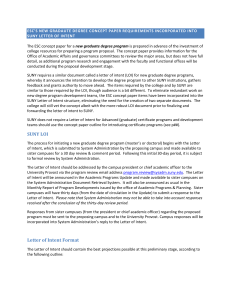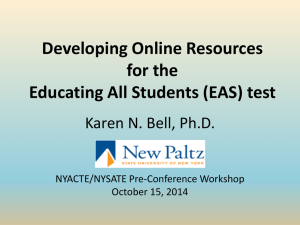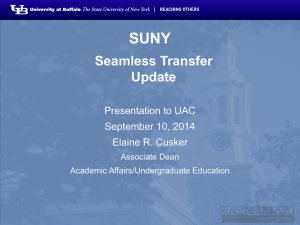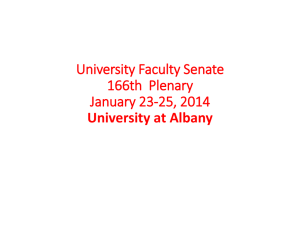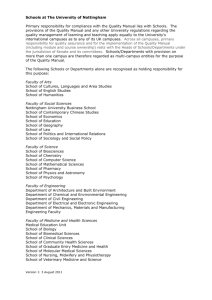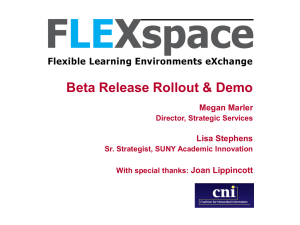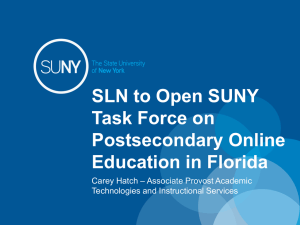10-1 - SUNY System - State University of New York
advertisement
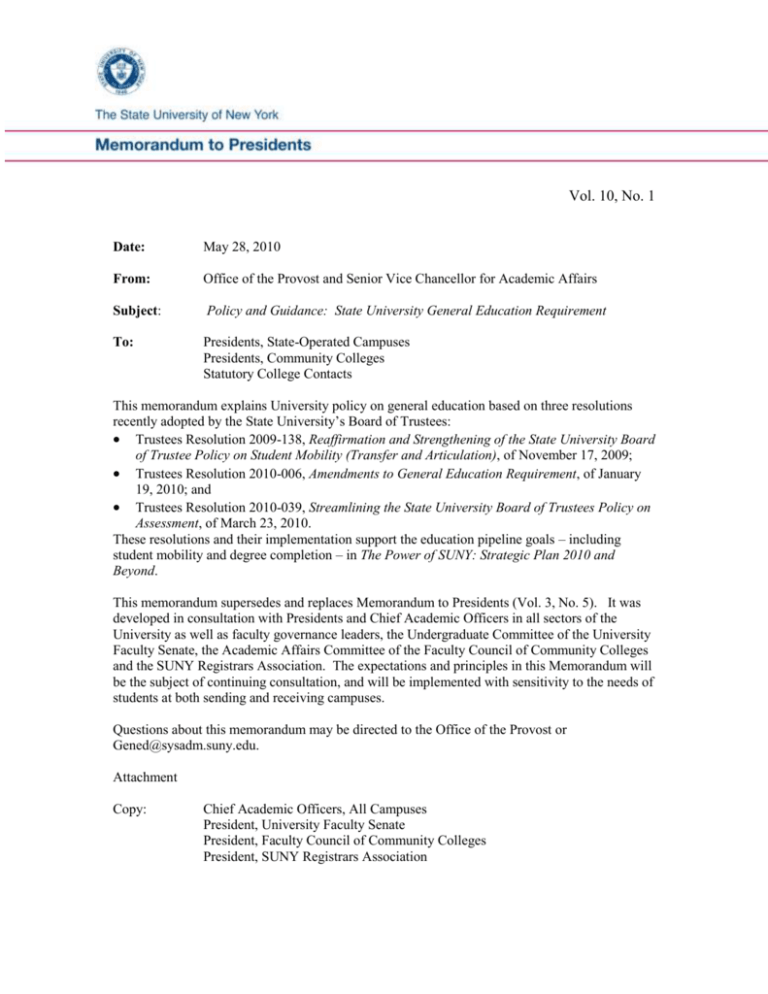
DISCUSSION DRAFT 4/15/10 Vol. 10, No. 1 Date: May 28, 2010 From: Office of the Provost and Senior Vice Chancellor for Academic Affairs Subject: Policy and Guidance: State University General Education Requirement To: Presidents, State-Operated Campuses Presidents, Community Colleges Statutory College Contacts This memorandum explains University policy on general education based on three resolutions recently adopted by the State University’s Board of Trustees: Trustees Resolution 2009-138, Reaffirmation and Strengthening of the State University Board of Trustee Policy on Student Mobility (Transfer and Articulation), of November 17, 2009; Trustees Resolution 2010-006, Amendments to General Education Requirement, of January 19, 2010; and Trustees Resolution 2010-039, Streamlining the State University Board of Trustees Policy on Assessment, of March 23, 2010. These resolutions and their implementation support the education pipeline goals – including student mobility and degree completion – in The Power of SUNY: Strategic Plan 2010 and Beyond. This memorandum supersedes and replaces Memorandum to Presidents (Vol. 3, No. 5). It was developed in consultation with Presidents and Chief Academic Officers in all sectors of the University as well as faculty governance leaders, the Undergraduate Committee of the University Faculty Senate, the Academic Affairs Committee of the Faculty Council of Community Colleges and the SUNY Registrars Association. The expectations and principles in this Memorandum will be the subject of continuing consultation, and will be implemented with sensitivity to the needs of students at both sending and receiving campuses. Questions about this memorandum may be directed to the Office of the Provost or Gened@sysadm.suny.edu. Attachment Copy: Chief Academic Officers, All Campuses President, University Faculty Senate President, Faculty Council of Community Colleges President, SUNY Registrars Association State University of New York Policy and Guidance: State University General Education Requirement Glossary of Terms General Education. An undergraduate curriculum of broad, high-quality courses that provides students with a set of non-specialized, coherent and focused educational experiences aimed at enabling students to acquire knowledge and skills that are useful and important for all educated persons regardless of their jobs or professions. (Source: Trustees Resolution 2010-006) SUNY General Education Requirement (SUNY-GER). The 30-credit requirement for SUNY baccalaureate degree recipients, which supports academic excellence as well as student choice, mobility and degree attainment by expecting students to demonstrate achievement of Universitywide learning outcomes in seven of ten knowledge and skill areas (two of which are required) and two required competency areas. Local General Education Requirements. General education requirements established by individual SUNY campuses to either add specificity to the SUNY-GER (e.g., require specific SUNY-GER areas) or exceed the 30-credit SUNY-GER Programmatic General Education Requirements. Specific general education requirements associated with individual academic programs, such as requirements in programs leading to teacher certification that are externally mandated. These may be met within the 30-credit SUNYGER, but they may also exceed the SUNY-GER (e.g., additional courses, minimum course grades). Liberal Arts and Sciences (LAS). The New York State Education Department requires a minimum number of credits in liberal arts and sciences courses in each registered undergraduate degree program, as shown in Table 1. In all cases, SUNY-GER courses may be counted as liberal arts and sciences courses. Table 1 Minimum Amount of Liberal Arts Content Required for Each Undergraduate Degree Minimum Minimum Degree Proportion of Number of Credits Content Associate in Arts (AA) 3/4 45 Associate in Science (AS) 1/2 30 Associate in Applied Science (AAS) 1/3 20 Bachelor of Arts (BA) 3/4 90 Bachelor of Science (BS) 1/2 60 All other undergraduate baccalaureate degrees (BBA, BE, BFA, BPS, BTech, etc.) 1/4 30 SOURCE: http://www.highered.nysed.gov/ocue/aipr/liberalarts.htm 1 I. Relevant Board Policies Relevant Board policies are contained in: Trustees Resolution 2010-006, Amendments to General Education Requirement; Trustees Resolution 2009-138, Reaffirmation and Strengthening of the State University Board of Trustee Policy on Student Mobility (Transfer and Articulation); and Trustees Resolution 2010-039, Streamlining the State University Board of Trustees Policy on Assessment. A. Trustees Resolution 2010-006, adopted on January 19, 2010, subsumes and revises all previous Board policies on the State University of New York General Education Requirement (SUNY-GER) and takes effect for students entering the University as freshmen in fall 2010. Salient Provisions i. Thirty credits of general education (or the equivalent) in SUNY-GER areas are required for a State University of New York (SUNY) baccalaureate degree. ii. Faculty shall establish the specific course requirements and content of one or more general education curricula reflective of the best practices in American higher education. Such curricula shall include broad, high-quality courses that provide students with a set of non-specialized, coherent and focused educational experiences aimed at enabling students to acquire knowledge, skills and competencies that are useful and important for all educated persons regardless of their jobs or professions. iii. Each general education curriculum shall be academically rigorous and comprehensive and shall complement and build on students’ academic preparation. Its design shall reflect consideration of the University’s commitment to a seamless education pipeline and timely degree attainment. iv. Each general education curriculum shall reflect the SUNY-GER, which requires baccalaureate degree recipients to have demonstrated: a. knowledge and skills in two required areas, Basic Communication and Mathematics; b. knowledge and skills in five of the following eight1 areas: Natural Science, Social Science, American History, Western Civilization, Other World Civilizations, Humanities, the Arts, and Foreign Languages; and c. competency in two required areas, Critical Thinking and Information Management. v. Consistent with the July 22, 2003, Memorandum to Presidents (Vol. 03, No. 5), the SUNY-GER’s ten knowledge and skills areas and two competency areas are defined in terms of student learning outcomes rather than a strict three-credit per area requirement. The student learning outcomes are contained in the Guidelines for the Approval of State University General Education Requirement Courses. <http://www.suny.edu/provost/generaleducation/GenEdGuideApp.cfm> 1 Previous policy required students to demonstrate knowledge and skills in ten of ten SUNY-GER areas. See Memorandum to Presidents (Vol. 3, No. 5). 2 vi. Campuses offering programs leading to Associate in Arts (AA), Associate in Science (AS) and/or baccalaureate degrees shall design their general education requirements for these programs to facilitate student mobility within the University and timely degree completion. vii. The Provost shall oversee implementation, including a process for approving appropriate exceptions for Specialized Colleges, Colleges of Technology, programs awarding two-year vocational degrees, and for other special circumstances. B. Trustees Resolution 2009-138, adopted on November 17, 2009, reaffirms and extends all previous Board policies on student mobility and transfer, and takes effect in fall 2010. Salient Provisions for Student Mobility and the SUNY-GER [N.B. These provisions are general statements of policy that should be implemented as indicated in Section II, Implementation Policies and Procedures.] i. Students transferring within the State University of New York shall be treated by their receiving campus in the same way as native students for all academic purposes. ii. Students transferring within the University who have met a SUNY-GER area at a sending campus shall be deemed to have met the same SUNY-GER area at a receiving campus. This applies to students transferring with or without a degree. C. Trustees Resolution 2010-039, adopted on March 23, 2010, replaces previous Board policies on assessment, and takes effect in fall 2010. Salient Provisions for the SUNY-GER i. A campus shall enhance quality by developing and implementing plans for the regular assessment and review of general education, such that the campus meets or exceeds the assessment standards set by State regulations and the Middle States Commission on Higher Education and, as appropriate, programmatic accreditation bodies. ii. A campus’s regular review of general education shall include the assessment of student learning in terms of the SUNY-GER student learning outcomes presented in the Guidelines for the Approval of State University General Education Requirement Courses.<http://www.suny.edu/provost/generaleducation/GenEdGuideApp.cfm> II. Implementation Policies and Procedures A. General education curriculum. A campus shall have one or more general education curricula consistent with University policy. Each such curriculum shall enable graduates of baccalaureate degree programs to meet the SUNY-GER student learning outcomes for Basic Communication, Mathematics, at least five of the other eight SUNY-GER knowledge and skills areas, and the two SUNY-GER competency areas. A campus may also have local and programmatic general education requirements. i. SUNY-GER courses. A campus shall have a faculty review process for adding, deleting or revising SUNY-GER courses and updating the System-level list of 3 approved SUNY-GER courses. Each such course shall be aligned with the SUNYGER student learning outcomes for its SUNY-GER area(s), as presented in the Guidelines for the Approval of State University General Education Requirement Courses.< http://www.suny.edu/provost/generaleducation/GenEdGuideApp.cfm> ii. Syllabi for SUNY-GER courses. In keeping with good practice and the expectations of the Middle States Commission on Higher Education, campuses are encouraged to have syllabi for SUNY-GER courses that include the SUNY-GER student learning outcomes. iii. Advanced or upper-division courses. To complement and build on students’ academic preparation and prior learning, and to promote seamless student mobility and timely degree completion, a baccalaureate campus is encouraged to permit both native and transfer students to use advanced or upper-division courses to meet SUNY-GER areas. iv. Student Waivers or Equivalencies. Where appropriate, in accordance with local academic policies, a campus shall afford students an opportunity to obtain a waiver or equivalency for a SUNY-GER area by demonstrating college-level proficiency in the student learning outcomes for that area. Waivers may also be granted as a reasonable accommodation for a learning or other disability. v. Programmatic Waivers. A campus may seek a waiver of a SUNY-GER knowledge and skills area for a specific academic program when the program’s curriculum is governed by external standards, such as, but not limited to, specialized accreditation. The required areas of Basic Communication and Mathematics may not be waived. The flexibility in the updated SUNY-GER reduces, and may even eliminate, the need for waivers. vi. Local and programmatic general education requirements. If a campus has local and/or programmatic general education requirements that specify the SUNY-GER areas to be met, or add course requirements beyond the 30-credit SUNY-GER, the campus shall promote student mobility within the University and timely degree attainment by providing clear and accessible information and advisement to prospective and enrolled students. vii. Information for students. A campus shall provide information to prospective and enrolled students about SUNY-GER, local and programmatic general education requirements through its catalog, website, advisement and other means. The information shall be clear, accurate, complete, current and easy to find. The Office of the Provost will work with campuses to help make information about general education requirements at each baccalaureate campus accessible to students and their advisors. [N.B. The updated SUNY-GER is effective for freshmen entering the University in fall 2010. However, a campus may extend the flexibility of the 7 of 10 SUNY-GER to transfer, continuing and returning students by giving them the choice of using the 10 of 10 SUNY-GER or the new 7 of 10 SUNY-GER.] 4 viii. Assessment of the general education curriculum. A campus shall have a process that meets the standards of the Middle States Commission on Higher Education for assessing student learning outcomes in general education, including the SUNY-GER student learning outcomes, and for using assessment results to promote improvement. B. Programs Leading to Associate in Arts (AA) and Associate in Science (AS) Degrees. Campuses should design AA and AS programs to enable students to complete as much of the SUNY-GER as feasible. Whenever practical, campuses should include a total of 30 credits of SUNY-GER in these programs, with flexibility for students to select SUNYGER areas that fit their transfer goals. C. Programs Leading to Associate in Applied Science (AAS) Degrees. The University’s student mobility policy does not address AAS programs, which are designed to lead to employment rather than transfer. However, campuses are encouraged to include as many SUNY-GER knowledge and skills areas as feasible, including Basic Communication and Mathematics, in their AAS programs, especially if a program tends to transfer significant numbers of students or graduates to SUNY baccalaureate programs. As appropriate, campuses are encouraged to advise students in AAS programs about transfer options. D. Student Mobility and Transfer. One of the goals of the SUNY-GER is to support a seamless education pipeline and degree attainment, consistent with The Power of SUNY: Strategic Plan 2010 and Beyond. i. Junior status for transfer students. As stated in Board policy adopted in 1990, and reaffirmed in Trustees Resolution 2009-138, “graduates of two-year colleges within SUNY with an AA or AS degree, when accepted in parallel programs at baccalaureate campuses of the University, shall be accorded full junior status and be given the opportunity to complete the requirements for a bachelor’s degree within four additional semesters of full-time work; and graduates of two-year colleges within SUNY, when accepted with junior status within parallel programs at baccalaureate campuses of the University, shall be granted full credit for general education courses taken and not be required to repeat successfully completed courses with similar content" Trustees Resolution 2009-138 added that “students transferring within the State University of New York will be treated by their receiving institution in the same way as native students of that institution for all academic purposes.” ii. Transfer of the SUNY-GER. Trustees Resolution 2009-138 requires that students transferring with or without a SUNY AA or AS degree will receive full credit for general education courses successfully completed (i.e., for which credit was awarded at the prior institution)…and will not be required to repeat successfully completed courses with similar curricular content.” This means that transfer students who meet the 30-credit SUNY-GER at sending campuses shall be deemed to have met the 30credit SUNY-GER at a receiving campus. Similarly, transfer students who meet a SUNY-GER area at sending campuses shall be deemed to have met that SUNY-GER area at a receiving campus. As feasible, to promote student mobility and timely degree attainment, a receiving campus shall waive local and programmatic requirements for transfer students who have completed the 30-credit SUNY-GER or who have met a SUNY-GER area that is comparable to a local or programmatic requirement. 5 iii. Grades in SUNY-GER courses. A SUNY-GER area successfully completed at a sending campus shall be accepted as meeting the same SUNY-GER area at a receiving campus. With regard to the transfer of a SUNY-GER course to meet local and/or programmatic requirements, a grade of C or higher shall be guaranteed acceptance. A grade higher than C may only be required of transfer students if it is also required of native students. iv. General Education Transcript Addendum. A sending campus shall provide a General Education Transcript Addendum (GETA) for each transferring student, and a receiving campus shall accept the GETA as certification of completed SUNY-GER areas. v. Baccalaureate programs: facilitating transfer from AA and AS programs. Baccalaureate campuses shall enable students with AA and AS degrees from SUNY campuses who are accepted in parallel programs to complete baccalaureate degrees within four semester of full-time study. To achieve this, campuses may use multiple approaches, including: a. entering into formal articulation agreements and other arrangements with regional campuses offering AA and AS programs; b. offering joint or dual degree programs with campuses offering AA and AS programs; c. incorporating SUNY-GER courses into the upper-division requirements of transfers’ baccalaureate programs; and d. developing upper-division general education courses or modules. vi. AA and AS programs: facilitating transfer to baccalaureate programs. AA and AS programs are intended to lead to transfer to baccalaureate programs in SUNY and other institutions. To support student mobility within the University, programs leading to AA and AS degrees should be designed to enable students to complete the SUNY-GER. Campuses with AA and AS programs may use such approaches as: entering into formal articulation agreements and other arrangements with regional SUNY baccalaureate campuses; developing special advisement tracks for students planning to transfer within SUNY; developing flexible certificate programs in general education that permit students to complete SUNY-GER areas appropriate for their transfer goals; and using the SUNY Learning Network (SLN), where SUNY-GER courses are identified in promotional materials and online at http://www.sln.suny.edu. The Office of the Provost will continue to work with campuses offering AA and AS degrees to promote seamless student mobility. vii. AAS programs: facilitating transfer to baccalaureate programs. The University’s policy on student mobility does not address AAS programs, which are designed to lead to employment rather than transfer. However, campuses are encouraged to include as many SUNY-GER knowledge and skills areas as feasible, including Basic Communication and Mathematics, in their AAS programs, especially if a program tends to transfer significant numbers of students or graduates to SUNY baccalaureate programs. 6 III. Resources for Campuses Trustees Resolution 2009-138, Reaffirmation and Strengthening of the State University Board of Trustee Policy on Student Mobility (Transfer and Articulation), November 17, 2009 < http://www.suny.edu/provost/transfer/BOTpolicies.cfm> Trustees Resolution 2010-006, Amendments to General Education Requirement, January 19, 2010 <http://www.suny.edu/provost/generaleducation/TrusteesResolution2010_006.cfm> Trustees Resolution 2010-039, Streamlining the State University Board of Trustees Policy on Assessment, March 23, 2010 <http://www.suny.edu/provost/academic_affairs/Resolution2010_039.doc.cfm> State University of New York Guidelines for the Approval of State University General Education Requirement Courses <http://www.suny.edu/provost/generaleducation/GenEdGuideApp.cfm> Template for adding or revising SUNY-GER course <http://www.suny.edu/provost/generaleducation/Forms/course-addition-form.doc> Template for deleting a SUNY-GER course <http://www.suny.edu/provost/generaleducation/files/Course_Deletion_Template.doc> Lists of approved SUNY-GER courses, by campus <http://www.suny.edu/provost/generaleducation/CourseList/mastercampuslist.cfm> Template for SUNY-GER program waiver request <http://www.suny.edu/provost/generaleducation/files/Programmatic%20Waiver%20Templat e.doc> Memorandum to Presidents (Vol. 3 No.1), January 2, 2003 <http://www.suny.edu/provost/MTP/MemorandatoPresidents.htm> Memorandum to Presidents (Vol. 3 No. 5), July 22, 2003 <http://www.suny.edu/provost/MTP/MemorandatoPresidents.htm> Middle States Commission on Higher Education’s Characteristics of Excellence <http://www.msche.org/publications_view.asp?idPublicationType=1&txtPublicationType=S tandards+for+Accreditation+and+Requirements+of+Affiliation> 7
